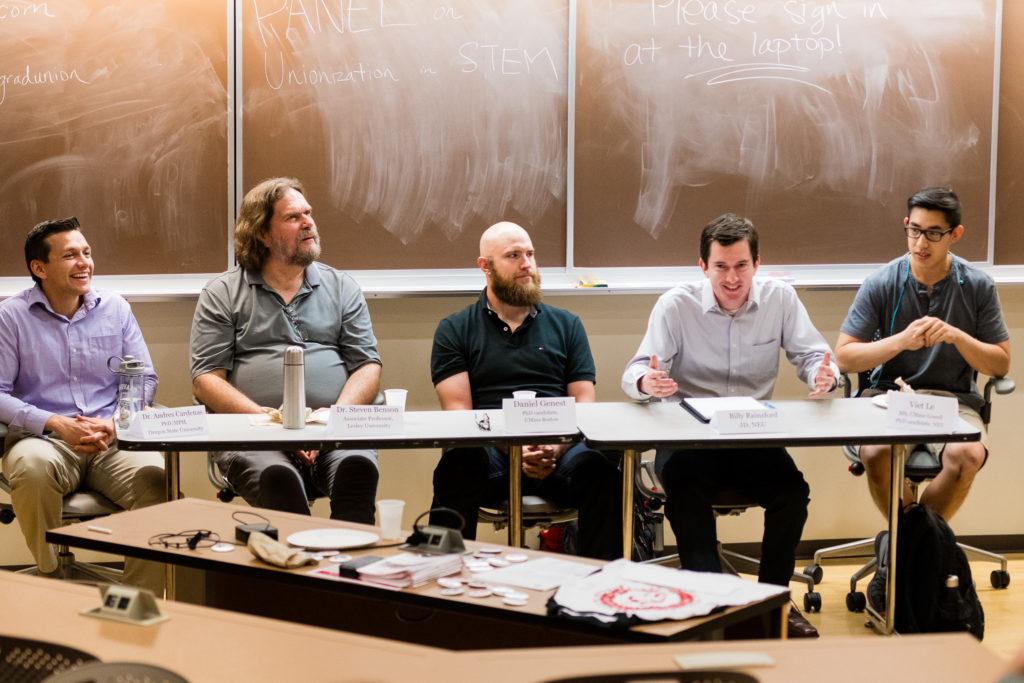Northeastern will not negotiate a separate agreement for a graduate student union election process, according to a Feb 28 email from the office of the provost.
Instead, the email from Vice Provost for Graduate Education Phil He told the students advocating to unionize to go through the National Labor Relations Board, or NLRB.
Members of the union seeking to represent graduate students working as teaching and research assistants, called Graduate Employees of Northeastern University, or GENU-UAW, worry the NLRB will deny them and other graduate student unions the right to organize under President Donald J. Trump’s administration.
“Several of those NLRB people, those anti-union people, have said they would do that if they got the chance,” said Alex Ahmed, a fourth-year Ph.D. student studying personal health informatics.
The union has obtained majority support from the graduate workers at Northeastern, qualifying them to set up an election through the NLRB, Ahmed said.
In his Feb. 28 statement, He said the university was not seeking to interfere in GENU-UAW’s right to an election.
“You may have received an email from graduate union organizers accusing the administration of preventing them from having an election to determine whether graduate students wish to be represented by a union. This never happened, nor could it happen,” He wrote.
The university, He emphasized, does not seek to prevent students from exercising their right to organize with the NLRB.
“That process is orderly and is designed to protect the rights of all voters, regardless of whether they favor a union or not. The administration did not and could not prevent the union from pursuing this process, and the union remains free to file a petition at any time,” He wrote.
However, according to a March 3 press release from GENU-UAW, the union does not want to go through the NLRB because they fear a denial could end other graduate students’ ability to unionize.
“Graduate workers are concerned that without guaranteed assurances from Northeastern, an election through the National Labor Relations Board would risk an appeal that overturns the right to organize of all graduate workers nationwide,” the press release read.
The press release mentioned a Dec. 12, 2017, decision by the board, where board member William Emanuel raised a potential challenge to graduate students’ status as workers.
Despite the provost’s denial, the union will continue to seek an agreement with the university to recognize its right to unionize. As part of the agreement, the university would agree to respect the union’s rights and not appeal an election to the NLRB, Ahmed said.
“We need the university to respect our rights because they’re not doing that right now,” Ahmed said. “It’s because of the current political landscape that we are put in this position.”
In the union’s fourth meeting with the provost’s office, the administration said it would not endorse a separate union election process that does not involve the NLRB, Ahmed said.
“The whole time … they were not forthcoming,” Ahmed said. “They took a hard line, and we couldn’t, in that meeting, say anything to get them to talk more.”
However, the university’s refusal to negotiate a union agreement comes from concerns about bypassing the established NLRB process, not because of anti-union sentiment, He said.
“The union is demanding a private process that eliminates the NLRB voter protections, limits discourse about unionization to communications from the union, and eliminates fundamental issues from discussion, such as whether students and faculty should have an employer/employee relationship rather than a student/mentor relationship,” He wrote in the Feb. 28 email to the graduate student body. “As an institution of higher education committed to the free flow of ideas and respect for all viewpoints, the administration could not agree to such a process.”
In a March 16 email to The News, Tim LaRock, a second-year Ph.D. student in network science, said the union is not seeking to get rid of NLRB voter protections in their elections.
“The union is not demanding a process that ‘eliminates NLRB voter protections’. In the draft election agreement we shared with the administration, we suggested that the election be arbitrated by the American Arbitration Association following NLRB procedure. This was the process followed for union recognition at NYU, not something we made up,” LaRock wrote.
LaRock also emphasized the union remains open to negotiation about the specifics of the election agreement, including who would arbitrate.
Now, Ahmed said GENU-UAW plans to collectively protest the administration’s decision.
“What we’ll need to do is, given that they currently don’t believe that we’re workers in addition to students, we have to show that we are visibly and publicly,” Ahmed said. “The university has moved in the past when we’ve taken a collective action.”
Ahmed emphasized that undergraduates and others were affected by the decision as well.
“Our working conditions are your learning conditions,” Ahmed said. “If we are not treated with the respect we deserve, that’s going to affect our ability to teach well.”
Updated March 16 at 10 a.m. to include an organizer sharing the union’s response to the statements from the Office of the Provost.









